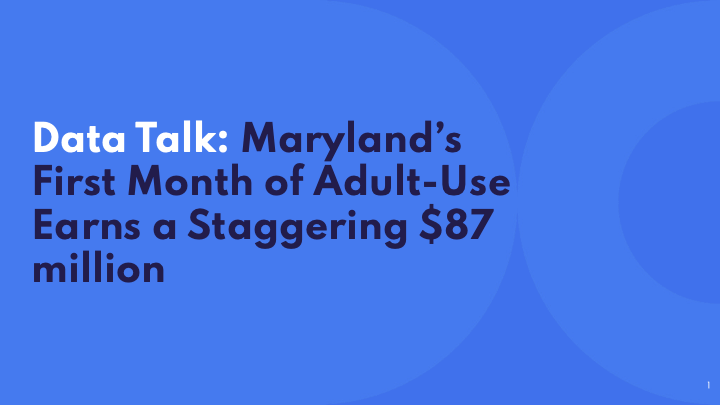
Data Talk: Maryland’s First Month of Adult-Use Earns a Staggering $87 Million
Maryland’s recreational sales began in July, generating an astonishing $87 million in the first month across 109 licensed dispensaries. The state is projected to surpass markets like New Jersey, New York, New Mexico, and Connecticut, potentially reaching $700-800 million in sales in its first year. Prices through the LeafLink platform have seen a significant surge, with flower prices climbing from under $1,000 to over $3,000 per pound between April and July. Retailers are working to meet the rising demand. The state plans to issue 925 new licenses by year-end, including 300 retail licenses, 175 cultivators, 200 processors, 200 delivery-only microbusinesses, and 50 consumption lounges, which will lead to exponential growth in wholesale sales, anticipated to exceed $500 million in 2024.
Author: Ben Burstein
“With prices and sales soaring, the state could hit $700 million to $800 million in sales in its first year surpassing markets like New Jersey, New York, New Mexico, and Connecticut”
What are we seeing from retail sales?
The first full month of adult-use sales more than doubled typical medical sales over the past year to $87 million. We expect sales to continue climbing as more retailers are approved for dual licenses and new licenses are issued towards year-end.
Which product categories are shining?
The top performing product in Maryland this year is flower, accounting for 54% of wholesale sales, 16 percentage points above the national average of total sales. Edibles are the second most popular form factor at 16% of sales, in line with country averages. Cartridges and concentrates make up 24% of sales, below the national average of 36%, likely due to Maryland brand’s medical focus for most of the year.
How is the Maryland market structured?
Maryland is a capped license market with 109 retail, 22 cultivation, and 28 processor licenses available in the market today. License holders are limited to no more than one grow license, one processor license, and four stores. 300 retail, 175 cultivation, 200 processing, 200 delivery-only microbusiness, and 50 consumption lounge licenses will be issued by Jan ‘24, split across standard and micro-licenses. Medical licenses holders are able to enter the legal market by paying a conversion fee of 10% of gross income from growers and processors (with a $2m cap) and 8% of gross revenue for dispensaries with the same cap, with a $100,000 minimum conversion price. Sales tax will be capped at 9%.
How is pricing fluctuating?
Given the state’s recent adult-use launch, prices have surged, with aggregated flower pricing rising from under $1,000/lb in the middle of April to over $3,000/lb at the beginning of July as retailers try to keep up with new legal demand. Currently limited former-medical only capacity is not enough to meet demand, more than doubling branded wholesale prices and nearly tripling bulk prices. Strong foot traffic post-adult use launch and a market average basket size of ~$90, near the top of all states, signals healthy retail dynamics with good pricing power.
Who are the top names operating in Maryland?
Today Maryland is primarily serviced by 6 manufacturers (Curio, MariMed, GTI, Curaleaf, TerrAscend, and Trulieve), each with the full allotment of attached stores. The five multi-state operators and Curio all own the largest canopies in the state, each with over 100k sq ft. The remainder of the market is split across independent retailers, smaller cultivators, and small manufacturing facilities primarily white-labeling out-of-state brands. One key provision of the new legal market is the requirement for at least 25% of shelf space in dispensaries to be reserved for products from social equity licenses. It typically takes 18-24 months for new cultivation facilities to come online. Given licensing for independent growers will start this year, new cultivation capacity should begin entering the market in 2H24/1H25.
What hurdles are being faced in Maryland?
Like every other operator in the industry, Maryland’s retailers have been negatively impacted by compliance-focused restrictions on accessing debit rails. The ability to transact outside of cash is essential for cannabis businesses to reach higher basket sizes, lower violent crime rates, and lower transaction costs. LeafLink offers two non-cash payment options, a lowest-cost-in-the-industry ACH rail and industry-leading invoice factoring product, to cannabis businesses to enable a safer, more-compliant industry.
Overall, Maryland’s adult-use started off incredibly strong. It’s a clear indicator that the steps and strategy taken to launch in the state were effective and something to take note of. It is also a clear indicator that the cannabis industry, while facing many challenges, continues to grow and exceed expectations.
Interested in learning more? Head to LeafLink.com for a full walkthrough on our platform or over to the LeafLink 2023 Wholesale Pricing Guide for detailed info on best purchasing practices.
About Ben Burstein
Ben Burstein is LeafLink’s Strategist, helping manage industry research, mergers & acquisitions, and strategic partnerships for the company. He’s been featured as an industry expert both on-air (ABC, FOX, NPR) and through digital channels (Forbes, Cannabis Business Times, MJBizDaily, St. Louis Business Journal). Prior to LeafLink, he worked at Citi Equity Research and Tuatara Capital. Ben is a graduate of the Wharton School of the University of Pennsylvania.